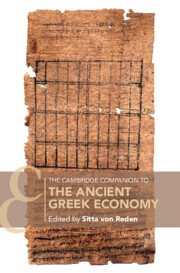Book contents
- The Cambridge Companion to the Ancient Greek Economy
- The Cambridge Companion to the Ancient Greek Economy
- Copyright page
- Contents
- Maps
- Notes on the Contributors
- Abbreviations
- Maps
- 1 Introduction
- Part I Diachronic Perspectives
- Part II Regional Perspectives
- Part III Structures and Processes
- 11 Population
- 12 Consumption, Nutrition, and the Grain Supply
- 13 The Agricultural Economy
- 14 The Non-Agricultural Economy: Artisans, Traders, Women, and Slaves
- 15 Markets
- 16 Money, Credit, and Banking
- 17 Dispute Resolution
- 18 Taxation and Tribute
- Part IV Networks
- Part V Performance
- References
- Index
- Cambridge Companions to the Ancient World
18 - Taxation and Tribute
from Part III - Structures and Processes
Published online by Cambridge University Press: 21 July 2022
- The Cambridge Companion to the Ancient Greek Economy
- The Cambridge Companion to the Ancient Greek Economy
- Copyright page
- Contents
- Maps
- Notes on the Contributors
- Abbreviations
- Maps
- 1 Introduction
- Part I Diachronic Perspectives
- Part II Regional Perspectives
- Part III Structures and Processes
- 11 Population
- 12 Consumption, Nutrition, and the Grain Supply
- 13 The Agricultural Economy
- 14 The Non-Agricultural Economy: Artisans, Traders, Women, and Slaves
- 15 Markets
- 16 Money, Credit, and Banking
- 17 Dispute Resolution
- 18 Taxation and Tribute
- Part IV Networks
- Part V Performance
- References
- Index
- Cambridge Companions to the Ancient World
Summary
This chapter reviews the evidence from the Greek world for tribute and taxation. It begins with some comparative considerations about tributary regimes and the impact of Achaemenid imperialism on the fiscal development of the Greek city-states, including the Delian League and the Hellenistic kingdoms. The transition from tribute to taxation is cast as a significant indicator of state formation. A fundamental theme in ancient Greek taxation is the relationship between coercion and consent, especially how political institutions facilitate the sharing of communal burdens by the rich. Extraordinary levies on property and persons were a common feature of city-states, which Macedon and the Hellenistic kingdoms also adopted. Finally, the chapter treats indirect taxes, which are thought to provide a much larger and more regular portion of state revenue in the Greek world.
Keywords
- Type
- Chapter
- Information
- The Cambridge Companion to the Ancient Greek Economy , pp. 264 - 278Publisher: Cambridge University PressPrint publication year: 2022
- 1
- Cited by

